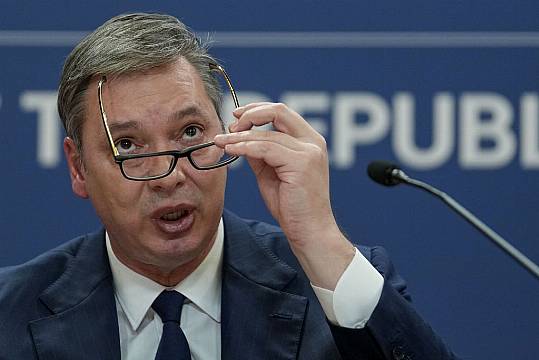Serbia will seek an urgent UN Security Council meeting to discuss the escalation of tensions with its former province of Kosovo, the country’s president said on Friday.
The move comes after Kosovo’s government decided to ban the use of the Serbian dinar and introduce the euro in areas where minority Serbs live.
Kosovo’s government has banned banks and other financial institutions in the Serb-populated areas from using the dinar in local transactions.
Kosovo’s central bank issued the new rules last summer.
Most of Kosovo uses the euro, even though the country is not part of the European Union.
But parts of Kosovo’s north, populated mostly by ethnic Serbs, continue to use the dinar and many there rely on the government of Serbia for financial support, often delivered in dinars in cash.
In an address to the nation on Friday, Serbian populist president Aleksandar Vucic said Kosovo’s ban of the dinar is intended to “ethnically cleanse” the Serbs from Kosovo, describing it as “a criminal strike” against the Serbs.
Serbia will ignore the currency rule, he said, and find a way so that Kosovo Serbs continue to receive their pensions and salaries from Serbia.
“People are scared, they are waiting in lines to get their money,” Mr Vucic said.
“On Monday, we will continue delivering the money through an authorised and licensed carrier.”
Serbs represent about 4% of Kosovo’s 1.7 million people.
Serbian forces fought a 1998-99 war with ethnic Albanian separatists in what was then the province of Kosovo.
About 13,000 people, mostly ethnic Albanians, died until a 78-day Nato bombing campaign pushed Serbian forces out.
Kosovo eventually declared independence in 2008, but the government in Belgrade does not recognise its neighbour as a separate country.
The EU and the United States have called on Kosovo to postpone the currency measure.
The measure has sparked concern among Western powers, fearing more tension in Kosovo’s relations with Serbia.
“I believe that the Western partners will keep their word and try to fight for the elementary rights of the Serbian population in Kosovo,” said Mr Vucic, who has maintained warm relations with Vladimir Putin’s Russia.
Serbia will send a formal request for the urgent Security Council session on Monday, Mr Vucic added.
The EU-facilitated normalisation talks between Belgrade and Pristina have failed to make progress, especially following a shootout last September between masked Serb gunmen and Kosovo police that left four people dead and ratcheted up tensions.
Both Serbia and Kosovo have said they want to join the EU, but the bloc’s officials have warned that their refusal to compromise in the talks is jeopardising their chances for membership.







